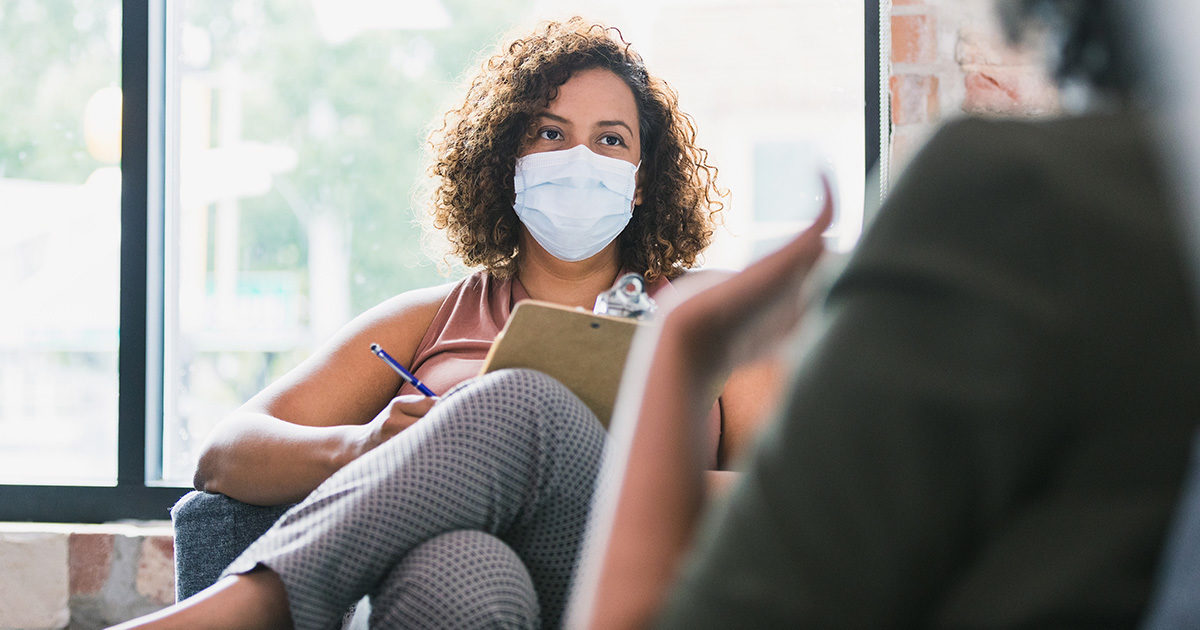Shouldering the Anxieties and Hardships of Patients Affected by COVID-19
How UT Health Austin’s Health Social Work care team is going above and beyond to support patients during the COVID-19 public health crisis
Reviewed by: Donna Shanor, LCSW, LCDC
Written by: Ashley Lawrence

The COVID-19 public health crisis has impacted countless lives, affecting the mental health of many and creating new barriers for people already facing mental illness. While all healthcare providers can be victims of compassion fatigue, or the emotional and physical exhaustion experienced due to consistent exposure to second-hand trauma and a distressing environment, behavioral health professionals are in a unique situation where they are tasked with both processing the anxieties and addressing the hardships of their patients.
UT Health Austin’s Health Social Work care team is comprised of licensed clinical social workers, dietitians, and a behavioral health pharmacist, who work alongside medical providers to treat the whole patient and not just their symptoms. “Our overall goal is to work in partnership with the medical providers to improve the health of our patients,” explains UT Health Austin’s Executive Director of Health Social Work, Donna Shanor, LCSW, LCDC. “By bringing together this variety of disciplines, we are able to truly offer our patients integrated, coordinated patient-centered care to enhance and improve their health. We like to think about healthcare in terms of wrapping itself around the patient and meeting them where they are. We understand there is more to addressing a patient’s health than what happens in a visit with a provider.”
In her role as Executive Director of Health Social Work, Shanor supervises the Health Social Work care team, which includes social workers, dietitians, and a behavioral health pharmacist, and coordinates their integration throughout various UT Health Austin clinics. “This is what makes us unique,” claims Shanor. “We are a team that spans across the clinical enterprise, and each social worker, dietitian, and pharmacist functions as part of their respective clinic. When we come together as a team, we share challenges and come up with solutions together.”
Social Workers
Social workers play a crucial role in helping patients manage their diagnosis as well as any personal, social, or emotional difficulties they may be experiencing. They provide a range of services from counseling and therapy to assisting patients with finding resources to alleviate financial barriers to medical care, completing difficult or daunting paperwork, and accessing affordable housing or financial support for medications.
“Very early on in the pandemic, our social workers created a comprehensive COVID-19 resource tool kit to share with both healthcare providers and the community as a whole,” says Shanor. “As a service to the community, we continue to review and add new resources weekly. Since then, we’ve also partnered with the Dell Medical School Department of Population Health to gather and share information on resources for our community. We have also encountered patients who no longer have health insurance because they lost their jobs, and our social workers have been really good about finding those patients alternative resources.”
Dietitians
Dietitians strive to improve their patient’s quality of life. They equip medical providers with patient education and work with patients, who have a new diagnosis of chronic illness (e.g.., diabetes, hypertension, cancer, etc.) or need to meet a specific weight range before they can undergo surgery, to come up with dietary goals and create healthier eating habits that will help their patients to meet those goals.
“At the start of the pandemic,” shares Shanor, “our entire team mobilized. Our dietitians immediately produced a resource list for accessing food, shared recommendations for grocery shopping, and stayed abreast of community resources for patients in need of food. There is a lot of food insecurity taking place. Our dietitians have seen (and are still seeing) patients that are having difficulty accessing food, many of who have dietary restrictions due to their specific medical needs.”
Behavioral Health Pharmacists
Behavioral Health pharmacists focus on empowering their patients to be involved in and understand their own treatment plans. They provide patient education and consultations to medical providers regarding optimal drug therapy and work with patients on understanding their condition, assessing the right medications, and avoiding unwanted drug interactions or toxicity.
“Throughout the pandemic, our behavioral health pharmacist has been in conversations with patients about whether they are going to be able to access their medication and if they can’t access their medication, evaluating how that will affect both the patient’s life and health,” reveals Shanor. “Additionally, our behavioral health pharmacist has seen an increase in patients affected by the pandemic needing more support for mental health treatment.”
UT Health Austin’s Integrated Behavior Health team is working diligently to continue gathering and connecting patients to resources to help ease the emotional, physical, and financial hardships that patients are facing as we navigate the changing COVID-19 public health crisis.
“I’m really proud of our team,” emphasizes Shanor. “Since the start of the pandemic, the team has really stepped up and gone above and beyond to help meet the needs of our patients and all of the clinics across UT Health Austin. It’s no easy feat to carry the stories of our patients and the grief and the pain that come with those stories. I am in awe of the resilience of our patients and the team’s ability to not only process everything, but also to come together in a time like this. We know that this is going to be quite a marathon, and we like to refer to it as a relay marathon. One person can’t run it, but we can pass the baton to one another by asking for help and helping each other out. Together, we will finish the race.”
Depending on your specific healthcare needs, a member of the Health Social Work care team may be a part of your healthcare journey at UT Health Austin. To request an appointment with UT Health Austin, call 1-833-UT-CARES (1-833-882-2737) or visit here.